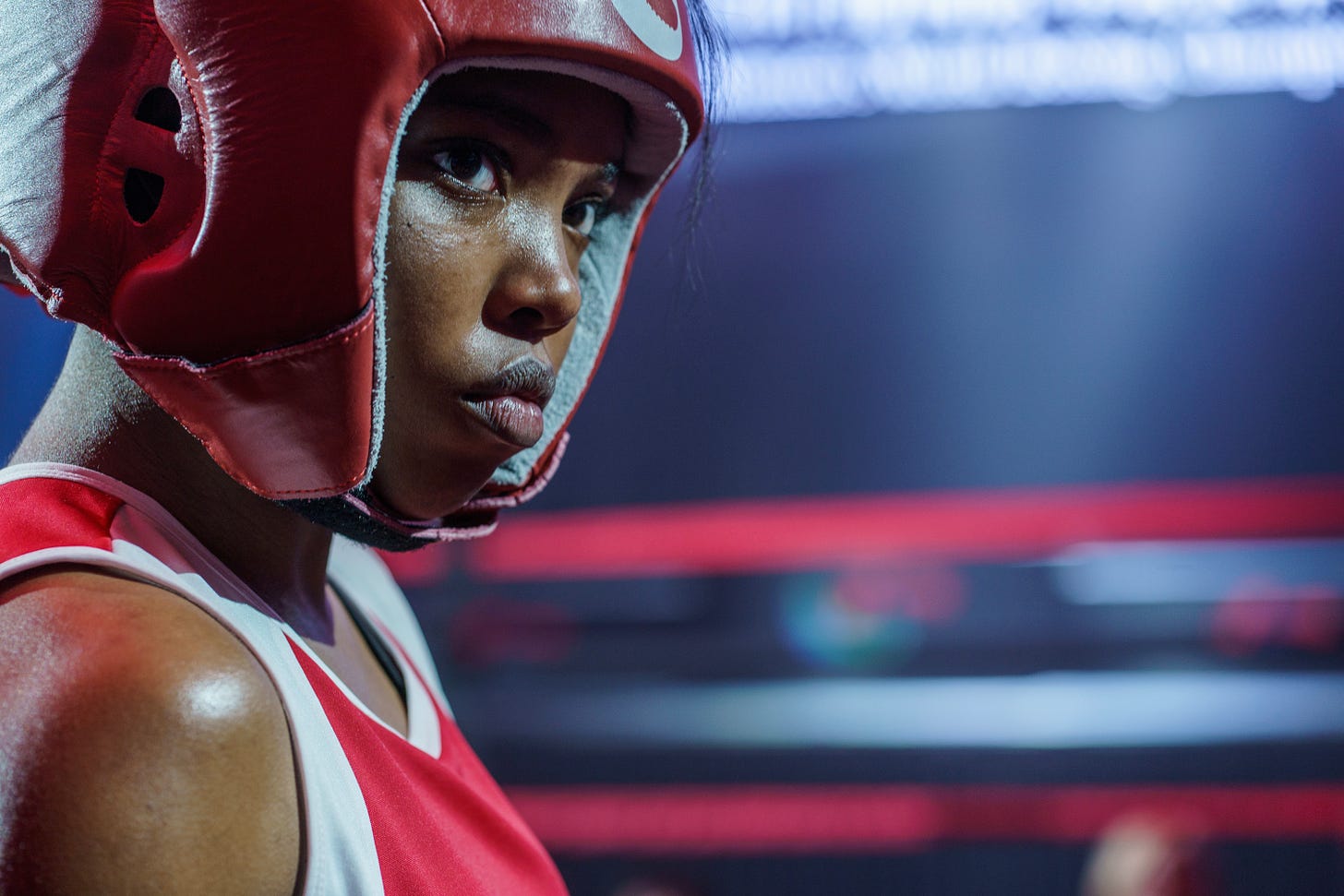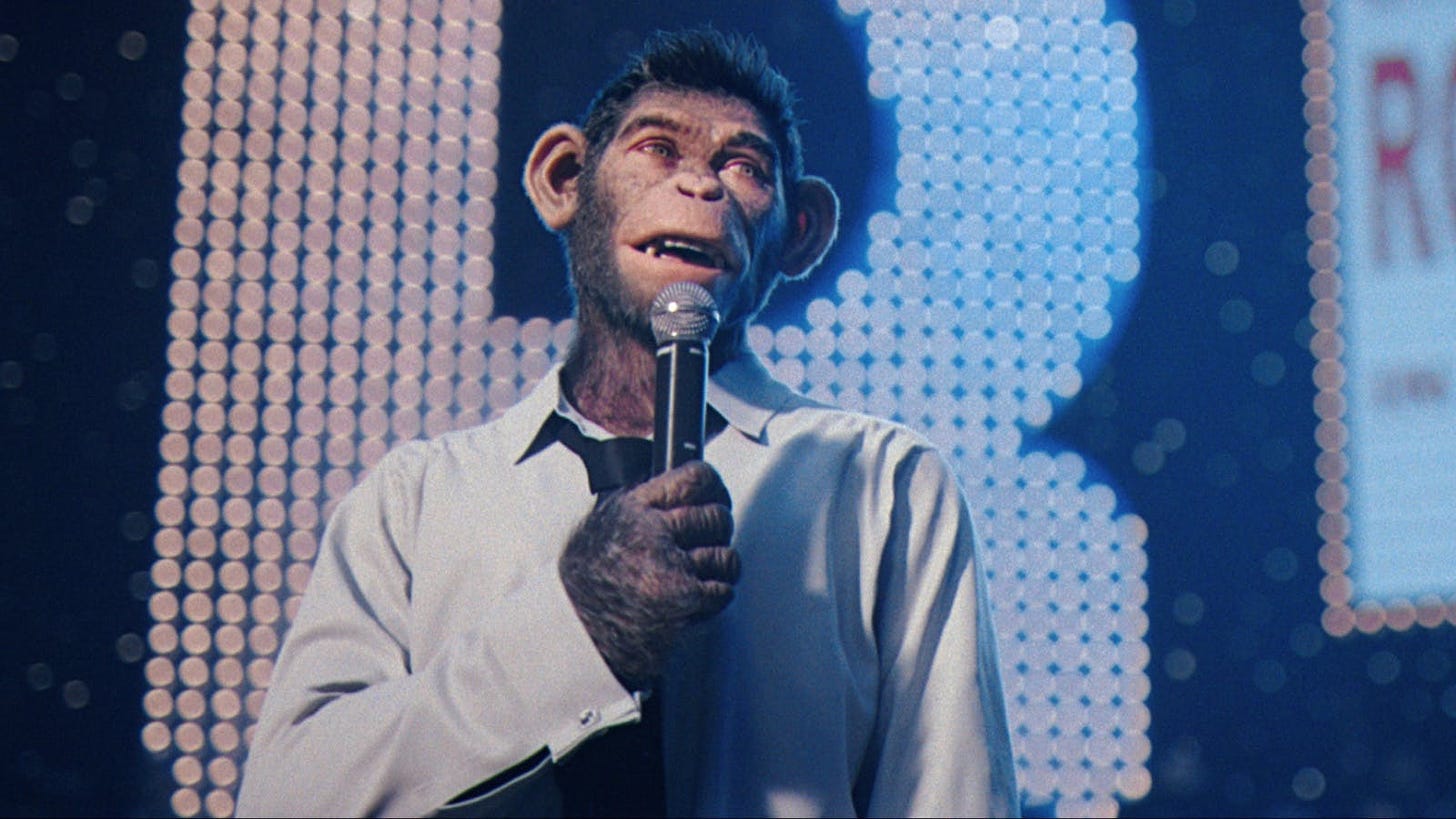In Review: 'The Fire Inside,' 'Better Man'
Two true stories enter the ring. One emerges triumphant.
The Fire Inside
Dir. Rachel Morrison
109 min.
The majority of underdog sports movies either have to massage the facts to fit the formula or, if they’re wholly fictional, merely adhere to a tried-and-true template. Yet the story of Cleressa “T-Rex” Shields (Ryan Destiny), a female boxer who emerged from Flint, Michigan, the rustiest of Rust Belt towns, to win gold as a 17-year-old at the 2012 Summer Olympics, has the virtue of following the rousing underdog script in real life. That doesn’t necessarily forgive the sheer familiarity of the first half or so of The Fire Inside, which plays like an earnest, conventional—albeit satisfying—movie of its type, with strong performances and fine-hued evocation of underclass Flint from cinematographer-turned-director Rachel Morrison. But the film doesn’t really hit its stride until a pivot point after the Games, when Shields has to plot a second act. That’s simply not what happens in sports movies (or in sports realities) around male athletes.
Written by Barry Jenkins, whose flesh-and-blood creations make for welcome counter programming to his CGI animals, The Fire Inside starts with a scrappy Shields biking across a neighborhood of condemned or ramshackle homes to a gym where Jason Crutchfield (Brian Tyree Henry) trains like-aged boys in the sweet science. Crutchfield insists for the umpteenth time that he doesn’t train girls, but Shields refuses to leave and he eventually caves, discovering that she has the power and determination to compete with his other charges. With an absent father and a mother (Oluniké Adeliyi) who often seems distracted by finding a substitute among a succession of bad candidates, Shields comes to rely on Crutchfield, who tries to nurture her talent while paying the bills as a cable guy. She winds up excelling as an amateur, but her long-shot bid to even make the Olympic team leads to an even longer shot at winning a medal in an event where Americans have fared poorly.
The rest may be Olympic history, but that’s not the end of The Fire Inside, just the beginning of a much more unusual and compelling story. Shields cuts an unlikely and reluctant figure as a feminist firebrand, but she by nature is uncomfortable with the differences in how men and women in sports are expected to comport themselves and she’s even more uncomfortable with the financial inequities that are revealed to her. She comes home expecting the Wheaties boxes and other commercial endorsement raining on her Olympic peers—she was a star to the Games, after all—and even the opportunity to continue training for next Games comes with an insulting stipend. What was the point of punching her way out of Flint if the system is set up to sink her right back into hand-to-mouth poverty?
The salary disparities between men and women in sports is an ongoing discussion, raised most recently in the pittance ($76,535) rookie sensation Caitlin Clark makes per year in the WNBA, despite her ability to pack stadiums and goose ticket sales wherever she goes. Yet translating a battle over dollars-and-cents into a gripping sports movie is not so simple, especially when Shields’ exploits in the ring are seemingly more dynamic. (She’s nicknamed T-Rex, after all, and has the short arms and ferocious power to back it up.) Yet Morrison and Jenkins ground The Fire Inside in Shields’ determination to seize what’s rightfully hers, whether that’s a boxing title or the life her talent warrants. She’s worth cheering in two arenas at once. — Scott Tobias
The Fire Inside is now playing in theaters everywhere.
Better Man
Dir. Michael Gracey
135 min.
It is quite possible, as an American, to be roughly the same age of British pop singer Robbie Williams and not have heard a single song of his, let alone been aware of his standing in his home country, where he’s been a chart-topping tabloid sensation for decades. Let me be even more specific: It is quite possible for this American, the one writing a review of the energetic Williams biopic Better Man, to know virtually nothing about him. (Take That? All Saints? Surely these are made-up outfits, not boy and girl bands as ubiquitous in their day as One Direction and Spice Girls.) The fortunate and unfortunate fact that Williams appears to have lived through every rise-and-fall cliché of the musician biopic does ground the film in the familiar, even if it does assume the audience knows a little more about him than it might. (Okay, that I might.) A meteoric rise followed by crippling self-doubt, messy public dust-ups, and a descent into booze and drugs? That ticks all the boxes.
Among the major elements that separate Better Man from its peers, however, is that Williams appears as a CGI chimp, with Jonno Davies serving as his motion-capture model and Williams himself doing all the voice work. That audacious decision makes the film appealingly offbeat for the most part, reinforcing a tone that Williams likes to call “cheeky,” referencing the capacity for self-deprecation and “right fucking entertaining” that has defined his image as much as his modern-day Rat Pack aspirations. He sings the songs that Nan loves, but he parties with Oasis, too. If he did one without the other, perhaps he wouldn’t have performed in front of 125,000 screaming fans for three nights at Knebworth in 2003, though he had to fight some personal demons—here in the form of vicious inner-voice primates—to get it done.
Remove the chimp conceit and the trajectory of Williams’ life and career is as Walk Hard as anyone else’s. Growing up a hardscrabble neighborhood in Stoke-on-Trent, where his flair for musical theater is about as appreciated as his ineptitude at soccer, Robbie idolizes his father Peter (Steve Pemberton), who in turn idolizes Sinatra and abandons the family at the first opportunity to pursue his dreams. He doesn’t get far, but his ambitious son jumps at the chance to audition in Manchester for Nigel Martin-Smith (Damon Harriman), a shrewd manager who’s assembling a boy band and admires Robbie’s talent and irreverence. That band, Take That, becomes enough of a sensation that Robbie can kickstart his self-sabotaging habits, which includes breaking them up for a solo gig and dating Nicole Appleton (Raechelle Banno), a member of the girl-band All Saints.
There are cycles of drug and alcohol abuse, intense stage fright and anxiety, and near-legendary womanizing—he jokes on TV about sleeping with “four out of the five Spice Girls”—but he proves a durable entertainer and makes a fortune on record deals and arena shows. Co-writer and director Michael Gracey (The Greatest Showman) seems to realize that Williams’ story is garden-variety stuff for the music industry, so he and Williams cram Better Man with off-hand jokes, visual panache, and a jukebox musical sampling of catalog favorites. There seems to be some faith here that a movie that captures Williams’ essence may finally give him some cachet in the States, and it won’t be Gracey’s fault if it doesn’t. The bland, hookless music will be the culprit. At least to these American tin ears. — Scott Tobias
Better Man is now playing in limited release.








Yeah Robbie William's solo stuff (to my ears) veers between hookless 'boy band guy went solo' and hookless 'fake Oasis'. He's good with reporters and press and that'll do a lot in the UK but I've failed my attempts to appreciate his stuff multiple times - sad!
There was that brief period in the late 90s where I'd just gotten satellite tv with M2, they were actually playing videos and only videos, and for some reason were really pushing Robbie Williams (and other "significantly bigger-in-Europe" acts like Placebo and Kylie Minogue). The horror fiend in me has a soft spot for Robbie solely due to the Hellraiser-esque Rock DJ video they aired constantly for a few weeks.